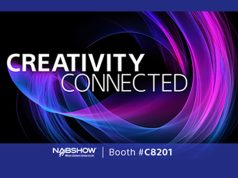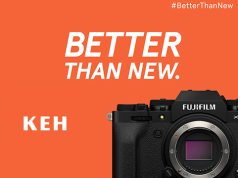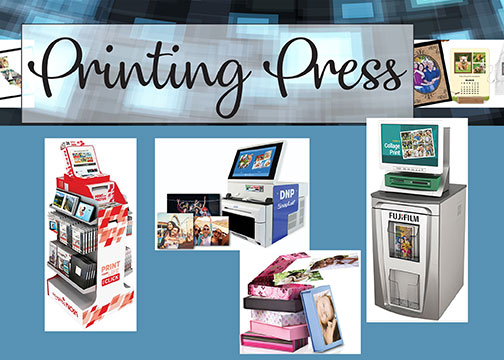
Technavio, a market research company focused on new and emerging technologies, predicts continued growth in the photo kiosks market.
The company estimates the market will reach nearly $1.5 billion in sales by 2019. “The ability of photo kiosks to create customizable gifts is a major factor that is expected to bolster market growth.”*
Consumers may be ordering fewer 4×6-inch prints than they did 20 years ago, but they’re spending more on high-margin photo products. These include large-format prints and photo gifts embellished with their favorite digital images. To capitalize on this trend, photofinishing manufacturers are expanding the capabilities of their photo kiosks and on-site printing equipment to accommodate more photo gift orders. They are also linking them to websites and mobile apps.
All-in-One Printing
Kodak Moments
Kodak Picture Makers are the most familiar photo kiosks in retail photofinishing. They were originally introduced in the 1990s as the self-contained Kodak Creation Station. This groundbreaking product allowed consumers to scan, edit and output images, primarily from Kodak Photo CDs. Today’s Kodak Picture Kiosk G20 accepts files from a variety of digital media, websites and mobile devices. It also allows consumers to edit, add special effects, create books and cards, and place orders for popular photo gifts.
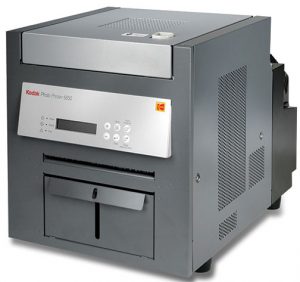
“The Kodak Moments Division is a world leader in retail photo kiosks and dry lab systems,” says Stephen Turberg, director of Current Retail Product Solutions, Kodak Moments Division. “Today, there are more than 110,000 worldwide kiosk placements, and we expect that number to grow. The combination of new software, refreshed content and also mobile connectivity advances makes the G20 a ‘best in class’ retail instant experience.”
The G20 offers an improved customer interface as well as a wide range of simple-to-create photo products. It is compatible with multiple instant Kodak photo printers, including the Kodak 6850. Moreover, the kiosk can be configured as a stand-alone unit or as an order station for the APEX dry lab. As such, it provides a wider array of incremental printers, including large-format Epson Stylus Pro printers.
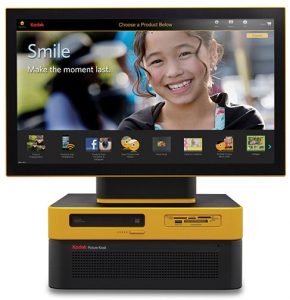
“Kodak Moments will also be launching two new printers in 2018,” adds Turberg. “A fully featured Kodak 6900 photo printer will become the next generation of instant thermal printers for retail and stand-alone applications. The Kodak DL2200 duplex printer will be designed for applications such as photo books, cards and copy shop products.”
Made For You App
Kodak Moments’ latest technological advancement, the new Made For You app, uses artificial intelligence and algorithms to mine customers’ phone and Facebook feeds for potential photo gift opportunities. The proprietary discovery engine curates “forgotten” Kodak Moments into “stories,” then suggests personalized photo products for customers to order.
“The new Kodak Moments platform has seen tremendous growth,” explains Rob Smith, vice president, chief marketing officer. “We now have four platforms for consumers to purchase products from—web, mobile web, iOS and Android apps, as well as a photo retail omni-channel. These platforms, in combination with an aggressive marketing campaign, have increased awareness of the Kodak Moments brand by 15 times. Consumers are 50% more likely to make a purchase and twice as likely to recommend the brand.”
Fujifilm
Fujifilm is another key player in photo retail printing. The company introduced its first minilab in the 1980s and the Frontier digital minilab in 1996. The Fujifilm brand continues to reach across the entire spectrum of imaging output products. Manny Almeida, president of the Imaging Division, Fujifilm North America Corporation, says the company’s success is closely tied to its relationship with customers.
“Fujifilm tracks consumer feedback through retailers and its popular new Wonder Photo Shop stores,” says Almeida. “Opened a year ago last summer, the New York City location is patterned after successful stores in Tokyo, Barcelona and other international cities. The stores provide consumers and professionals with a creative space to explore the joys of photography.

“One thing about the Wonder Photo Shop in New York is the response,” he adds. “We hear, ‘I’m so glad I found you, because this is a place I can sit down and create.’ Customers can get help if they need it and make the product exactly the way they want. It’s the perfect environment for generating feedback, which helps the company review and improve its photo apps and imaging systems.”
GetPix Solutions
Fujifilm offers a full range of printing solutions, from the stand-alone GetPix print station and printer for high-traffic environments to wet and dry minilabs for high-volume print production. The GetPix consists of a VNX kiosk terminal with a 22-inch multi-touch screen, a Frontier-S DX100 inkjet printer and an optional GetPix kiosk cabinet that holds up to two printers. Fujifilm also offers a micro minilab system with a touch-screen monitor, high-capacity controller, Landscape Workflow Management software and a cabinet that accommodates four printers.
GetPix 6.0 software provides a simple interactive workflow, image-editing capabilities and remote software updates. It also provides wireless file transfer from customers’ digital devices and social media. In addition to prints, the GetPix Smart Photo Solution allows consumers to create high-margin customized photo products.
Minilab Solutions
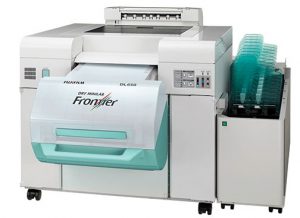
Fujifilm’s Frontier DL650 dry minilab uses the same six-color Vividia inkjet system employed by the Frontier-S DX100 and produces prints up to 12×48 inches. Fujifilm’s wet lab, the Frontier LP5700R digital minilab, uses CP-49E chemical processing. In addition, if offers one-touch chemical mixing and a dry-to-dry processing time of only 1 minute, 22 seconds. Both can be integrated with other Fujifilm products.
Mitsubishi Electric
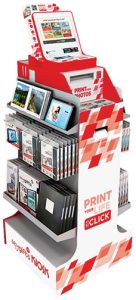
Best known for its high-quality dye-sublimation printers, Mitsubishi Electric offers a series of compact photo kiosk solutions designed for high-traffic retail sales. The basic KioskGifts smart kiosk includes an interactive touch-screen monitor, a Mitsubishi printer and an integrated display of packaged photo gifts. KioskGifts products include EasyGifts albums, personalized calendars, greeting cards, personalized gift boxes and prints.
Other Mitsubishi kiosk configurations include the KioskGifts Flex, a modular and scalable system capable of incorporating one to five printers for making instant gift products. In addition, the KioskGifts Flexilab solution is designed for photo studios and retailers. The Flexilab provides more professional editing tools and a wider range of instant photo gifts to attract serious photo enthusiasts.
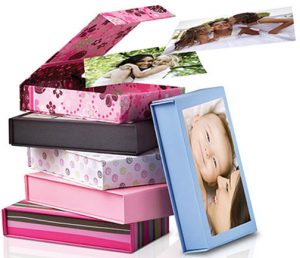
Mitsubishi’s newest dye-sub printer, the CP-D90DW, includes a panorama format up to 6×20 inches, postcard media and a perforated paper that produces 3.5×4-inch prints with a perforated 2-inch strip along the left side. Smart Photo Print apps, available for Apple and Android devices, allow customers to send images from their smartphones in-store or order prints online.
DNP
DNP Imagingcomm America Corporation introduced a new mini kiosk system in November. The Snap Lab SL620A is an all-in-one solution targeting retail applications at amusement parks and other attractions. It combines the DNP DS-Tmini order terminal head, DS620A dye-sub photo printer and customized DiLand software to provide wireless iOS and Android smartphone connectivity.
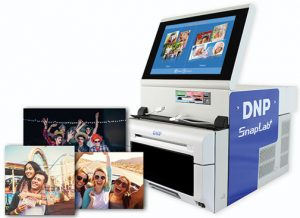
The Snap Lab is easily set up for streamlined event mode operation or for end-user-facing operation. It has a powerful quad core processor, a 10-inch high-resolution touch-screen panel and a range of media card readers. The DS620A produces print sizes up to 6×20 inches, including three square formats for Instagram photos. Customers can also create photo books, border prints and a wide variety of custom photo souvenirs. The integrated photo-editing software allows users to edit photos as well as add borders and custom text.
B2B and Back-End Support
Photo Finale
Photo Finale, a business-to-business kiosk developer, provides white-label photo kiosks, photo-ordering websites, professional gallery websites and customized iPhone and Android apps for photo retail clients.
Integrated with the self-service APM kiosk, Photo Finale’s suite of products is also branded with the retailer’s name, logo, products and services. As a result, it provides seamless photo ordering and storage options. This includes the consumer’s ability to set up an online account through the retailer’s website. 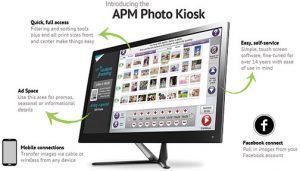 The APM photo kiosk allows consumers to order prints, enlargements and thousands of creative photo products. They can start an order at the kiosk and finish it later online. They can also upload images to their online account and access the images directly from the kiosk. The new APM 10.0 software, introduced early this year, is twice as fast as the previous version. It also supports Apple’s New HEIF (High Efficiency Image File) default image format.
The APM photo kiosk allows consumers to order prints, enlargements and thousands of creative photo products. They can start an order at the kiosk and finish it later online. They can also upload images to their online account and access the images directly from the kiosk. The new APM 10.0 software, introduced early this year, is twice as fast as the previous version. It also supports Apple’s New HEIF (High Efficiency Image File) default image format.
Noritsu America
Noritsu America Corporation is credited with launching the one-hour photo processing revolution. The company introduced its first minilab in 1976. The Noritsu QSS-1 (Quick Service System) was the first in a series of automated printer–processors that evolved into the company’s current G series wet labs. The series now includes the QSS 3800G, 3801G and 3704G.

In the early 2000s, Noritsu partnered with Seiko Epson Corp. to develop compact, high-speed digital minilabs using Epson inkjet devices and technology. The partnership eventually led to the QSS Green series of dry photo labs. The company recently announced the fourth in this series. The QSS Green III duplex dry minilab uses replaceable ink cartridges instead of traditional AgX chemicals. It also offers a wider range of print sizes than earlier models, including panoramic prints up to 55 inches.
When asked how wet and dry processing solutions impact the photo retail environment, Glen Hart, vice president of Imaging Sales at Noritsu, says he sees a dual role. “The retail printing market has transitioned primarily to inkjet and dye-sub printers, partially due to the lower hardware cost and reduced volume requirements. However, we’re also seeing an increase in demand for wet printers. Approximately two thirds of the images printed around the world are still done on traditional AgX printers. For high-volume labs, high-end album printers as well as labs that cater to the world’s most discerning photographers, wet labs continue to endure.”
Software Improvements
All Noritsu printers feature open architecture. This allows for direct connection to major kiosk software and making it compatible with most existing lab equipment. Recent improvements were made to the EZ Controller workflow and production software. They include the ability to recognize as well as render images in both sRGB and Adobe RGB formats; automated red-eye correction for up to five people; added support for RAW, PNG and LZW compressed TIFF files; Windows 10 compatibility; and the ability to automatically recognize imbedded profiles.
* Technavio: Global Photo Kiosk Market, Market Analysis 2015–2019



